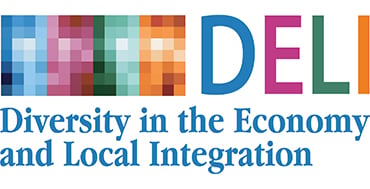The overall DELI objective is to support city-led learning, advisory, peer review and business partnership platforms to support migrant entrepreneurship at the local level and to encourage economic strategies and policies consistent with the principles of equal treatment, integration and diversity management.
The project aims specifically at:
- Bringing together private, public and non-governmental partners to support development of economic strategies and programmes that are socially sustainable and in line with diversity and intercultural integration strategies;
- Collecting and disseminating reliable data, by conducting research on local policies, structures, clusters and market opportunities for under-represented migrant and ethnic businesses;
- Establishing quality management standards for local governments aiming at supporting migrant entrepreneurship and diversity procurement;
- Supporting the development and implementation of diversity procurement standards and policies aiming at increasing access of migrant enterprises to public & private procurement;
- Designing, testing and implementing practical tools for assessing local policies, structures and institutions and disseminating the tools to local partners.
To fulfill these objectives, the project will involve a five-step multi-level, multi-sectoral and multi-stakeholder process that will include following activities:
I. DATA COLLECTION & MAPPING
aiming at organizing the minimum of data needed by city-partners, local governments, local policy makers, and other stakeholders in order to facilitate delivery and management of DELI activities, and implementation of project-related policies at local level. Data collection & mapping will include (1) diversity profiles per city based on contextual data within broader political, economic, and social systems and (2) description of legal and policy frameworks governing business & diversity (positive action mechanisms, anti-discrimination, social clauses and procurement).
II.DEVELOPMENT OF QUALITY MANAGEMENT STANDARDS
aiming at (1) supporting under-represented migrant and ethnic businesses and (2) designing & implementing diversity procurement strategies at the local level, standards will be established on the bases of tools previously developed by the Council of Europe (Intercultural Cities Index) and Migration Policy Group (Supplier Diversity, INTI-Cities and DIVE benchmarks); these standards will be consistent with internationally agreed principles of good policy & strategy planning, implementation and monitoring.
III. DIVERSITY & ECONOMY ROUNDTABLES (DER)
the DER process will be launched in April-May 2014 (launch meeting) to establish private & public dialogue to improve the environment for economic integration of migrants and support of migrant entrepreneurship. DER will involve local administrations and relevant departments (city planning, economic development, procurement), non-governmental agencies, including business support agencies as well as local private actors. Two DER meetings will be organized during the project lifespan (launch and post-assessment) and are expected to continue after the project termination.
IV. DEVELOPMENT OF ON-LINE SELF-ASSESSESSMENT TOOLS
the primary purpose of the tools is to help local governments engage with different stakeholders to map and understand existing gaps and challenges in implementing strategies that support migrant entrepreneurship and diversity procurement; the tools set a baseline and develop status reports for cities and municipalities that have committed to supporting migrants' economic integration.
V. SELF-ASSESSMENT REVIEW
with assistance of the Council of Europe and Migration Policy Group, and using the indicators designed in the step IV, cities will conduct self-assessment reviews. Building on the gaps identified and recommendations made throughout the review process, the identification of follow up activities will help local governments to incorporate support to migrant entrepreneurship in the local planning processes. The self-assessment will lead to a certification as well as a list of organizational changes (road maps) to be implemented to confirm certification
FOLLOW-UP AND SUSTAINABILITY
the call back process for confirming and renewing the certification will be carried out two years after the project termination by the Council of Europe and Migration Policy Group. As a long-term follow-up, it is expected that self-assessment reviews will also complement information gathered through European monitoring systems, (Council of Europe Intercultural cities index review and reporting based on EU integration indicators). Cities can choose to share their results with corresponding ministries as part of the national reporting process.

Round tables
Contacts
Lilia Kolombet
CoE Project Manager
 +33 390 21 53 85
+33 390 21 53 85
 +32 22 35 05 05 (Brussels)
+32 22 35 05 05 (Brussels)
Daria Cherepanova
CoE Project assistant
 +33 390 21 58 99
+33 390 21 58 99
Jan Niessen
Migration Policy Group
Director
 +32 2 230 59 30
+32 2 230 59 30
Alex Kirchberger
Migration Policy Group
Researcher
Beth Ginsburg
Migration Policy Group
Researcher










